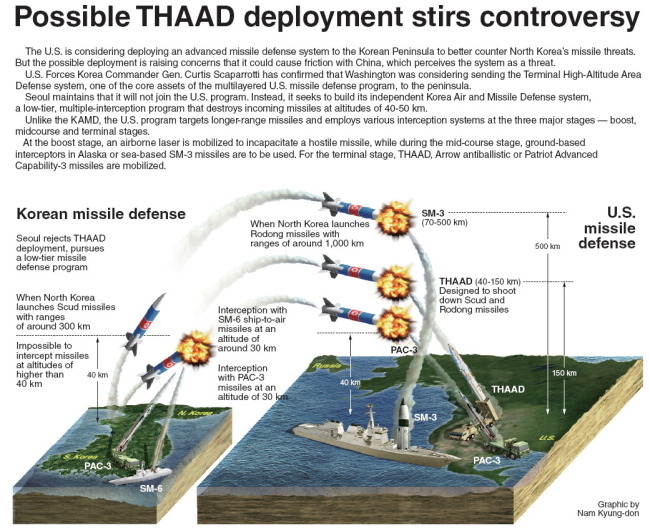
The U.S. is considering deploying an advanced missile defense system to the Korean Peninsula to better counter North Korea’s missile threats. But the possible deployment is raising concerns that it could cause friction with China, which perceives the MD system as targeting it.
U.S. Forces Korea Commander Gen. Curtis Scaparrotti has confirmed that Washington was considering sending the Terminal High-Altitude Area Defense system, one of the core assets of the multilayered U.S. MD program, to the peninsula.
Seoul maintains that it would not join the U.S. MD program. Instead, it seeks to build its independent Korea Air and Missile Defense system, a low-tier, multiple-interception program that destroys incoming missiles at altitudes of 40-50 km.
Unlike the KAMD, the U.S. MD program targets longer-range missiles and employs various interception systems at the three major stages ― boost, midcourse and terminal stages.
At the boost stage, an airborne laser is to be mobilized to incapacitate a hostile missile, while during the mid-course stage, Ground-Based Interceptors in Alaska or sea-based SM-3 missiles are to be used. For the terminal stage, THAAD, Arrow antiballistic or Patriot Advanced Capability-3 missiles are mobilized.






![[Herald Interview] 'Trump will use tariffs as first line of defense for American manufacturing'](http://res.heraldm.com/phpwas/restmb_idxmake.php?idx=644&simg=/content/image/2024/11/26/20241126050017_0.jpg)
![[Exclusive] Hyundai Mobis eyes closer ties with BYD](http://res.heraldm.com/phpwas/restmb_idxmake.php?idx=644&simg=/content/image/2024/11/25/20241125050044_0.jpg)
